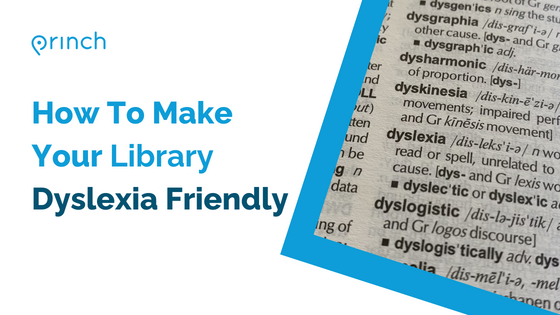In this week’s Princh Library Blog post, guest writer Sarah Sarich shares her insights into what libraries can do to improve inclusion for users with dyslexia. Check it out.
Imagine trying to manage everyday life with a disability that makes it difficult to read, write or spell. That is the reality that 15-20% of people with dyslexia face. Library spaces can feel particularly intimidating for people with dyslexia. Providing an inclusive space and needed resources can help users with dyslexia feel welcome and supported.
Dyslexia is a neurobiological learning disability managed through proper identification and specific instruction, although its impacts may persist into adulthood. Dyslexia crosses cultural and socio-economic backgrounds and is the most common learning disability, representing 80–90 percent of all those with learning disabilities.
Learn the key aspects of Princh! Watch our on-demand demos at your convenience and see what makes Princh such a simple solution. Watch our demos here.
Some common signs of dyslexia include:
- slow, inaccurate reading
- guessing or skipping words
- poor spelling
- letter reversals
- problems with pronunciation
- avoidance of reading tasks
- family history of reading problems
What can libraries do to improve inclusion for users with dyslexia? Here are a few practical ideas:
Leverage knowledge
Help staff build a solid understanding of dyslexia and its impacts. Awareness is the first step to acknowledging users with dyslexia and empowering staff to build a community of support. Know the common signs of dyslexia in different age groups and be aware that many people with dyslexia do not have a formal diagnosis.
Contact local dyslexia awareness groups such as Decoding Dyslexia or the International Association for Dyslexia. They are a wealth of information and may be eager to help. Made by Dyslexia offers free, basic training and a great place for library staff to start learning more.
Chances are you also have staff members who are dyslexic. If they are open to sharing, utilize their unique experiences and perspectives. Dyslexic thinkers bring a wide array of strengths and are often big-picture thinkers, social influences and creative problem solvers. See the value that employees with dyslexia bring and embrace diversity within library staff.
Acknowledge Users with Dyslexia
Representation helps foster a feeling of belonging. Find opportunities to let users with dyslexia know they are welcome and supported. Appoint a Dyslexia Information Officer as a central point of contact in the library and consider offering library tours focusing on dyslexia-friendly services.
Celebrate Dyslexia Awareness Month, which is recognized internationally. Consider shelf displays, bulletin boards, curated collections or social media posts that showcase resources, catalogue items and positive messages about dyslexia. Offer informative programming utilizing expertise from within your library and the community. Ensure library collections are representative and include dyslexic authors and characters. This list of books is a great start!
Invest in Evidence-Based Early Literacy
Providing sound literacy instruction to emerging readers is vital to long-term reading success.
Early literacy instruction is evolving to align with current, evidence-based research. Effective reading instruction is systematic, explicit, and cumulative. It must include phonemic awareness, phonics, comprehension, vocabulary and fluency. Reading strategies that rely on guessing, looking at pictures or guided reading are less effective and should not be relied upon. Gain a solid understanding of how reading develops and current best practices in reading instruction. These practices can be incorporated into literacy programming.
Add decodable readers to library collections. Unlike early readers or levelled readers, decodable books introduce sounds and words in a carefully planned scope and sequence. Consider pairing these books with games and activities that reinforce letter/sound knowledge. Some libraries have successfully introduced dyslexia backpacks and take-home bins with a collection of early literacy information, books, games and resources.
Support Parents, Caregivers and Educators
Library services and programming need to support children and their caregivers. Navigating the emotional and learning challenges that come with dyslexia can be challenging. Offer information and programming that showcase the strategies families can use at home to support decoding and language comprehension.
Many educators are shifting to evidence-based literacy practices to better align with current research. Offering resources that support teachers resources that support teachers in developing their knowledge is another key tool for advancing literacy in the community.
Expand Services
Offer extended loan time for print materials. People with dyslexia may read slowly and often need more time to digest written materials.
Expand collections that appeal to readers with dyslexia, including audiobooks, Playaways, e-books, easy read, decodable readers and graphic novels. Make it easy to find these items in the catalogue by using a specific search term such as “dyslexia-friendly”.
Expand collections that appeal to readers with dyslexia, including audiobooks, Playways, e-books, easy read, decodable readers and graphic novels. Make it easy to find these items in the catalogue by using a specific search term such as “dyslexia-friendly”.
Focus on Accessibility
Accessibility is vital to ensure people with dyslexia have meaningful access to library materials and services. Offer text-to-speech, speech-to-text, screen readers, contextual spell checkers, reading pens and other devices. Be knowledgeable about apps and built-in accessibility tools for cell phones, tablets and computers.
Have clear, easy-to-read signage within the library and consider using pictures where appropriate.
Change can seem overwhelming, so start small, have a growth mindset and celebrate each success! True inclusion is a process that takes time to foster and grow.
We will be back with another interesting article from the library world soon!
Want more insights from libraries across the world?
Subscribe to our blog to receive new library insights directly to your e-mail.
Sarah Sarich
Sarah Sarich is the President and a founding member of Decoding Dyslexia Alberta. She is a passionate advocate dedicated to raising awareness about dyslexia and empowering families to support their children.
Recent posts
Unusual Libraries You Never Knew Existed
In this week's Princh Library Blog, recurring guest writer Nina Grant brings us a collection of peculiar, if unusual, libraries. Enjoy! [...]
Enhancing User Experience For Libraries In The Digital Age
In this week's Princh Library Blog post, recurring guest writer Sam L. Bowman covers how your library can improve the user experience on [...]
Library Password Practices—Balancing Accessibility and Security
In this week's Princh Library Blog, recurring guest writer Nina Grant discusses a basic, but nevertheless crucial digital security principle: secure password [...]


